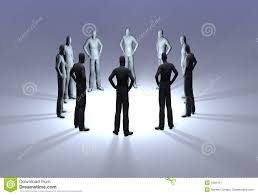NEWS
When Men Are Gathered Together, Beware…Danger
The concern that men are up to something nefarious when in a clump, is understandable. Most of the mass destruction in the world by military, religious, governmental, and corporate idiocy was hatched by white guys gathered in some back room. And these decisions are often made by the most emotionally immature and psychologically unconscious of our species. The ascension to places of power in complex and impersonal bureaucracies often requires the ability to shut down any feeling in service of cold intellectual decision making.
These hard-driving movers and shakers can be adept at looking good, acquiring wealth, lots of stuff, and saying things like, “I got this”, and “I’m not weak, I don’t need anybody”. Unfortunately, these guys need healing more than anyone. I’ve been working with emotionally wounded men for 25 years (which is most of us), and it’s the guys that are married to success and intellectual toughness that are the most dangerous to themselves and others. It usually takes a giant train wreck in their life to be open to inner work and a different kind of men’s gathering.
After a particularly strong men’s retreat about a decade ago, a friend and I stood across from each other in an adjacent park sharing a tearful hand-on-each-others-heart connection (I know, it’s weird. But much of the work seems weird because we don’t have many healing rituals for men in our modern world). Suddenly, two cop cars came skidding in. They had been called to break up the fight. The neighbor who called and the officers who arrived could think of no other reason that men would be standing tall and facing each other!
The major obstacle to overcome on the way to healing is not the cultural bias against men gathering together, but the internal terror that men carry about being seen as vulnerable. The wildly exaggerated fear that feelings and healing are related to homosexuality or being excessively feminine is rampant. My dad was clear and enthusiastic that I should never be a “limp wrist” or “act like a girl”. I was stiff as a board and robotic when I came into men’s healing work, and It took quite a while for me to loosen up and find a less rigid authentic carriage.
We can argue for hours on Facebook about the leaders we think are incompetent, who may be coldly pursuing selfish pursuits. We could rail against corrupt politics and corporate greed. And/or, we can take our male selves, or our male partners to a men’s group or healing intensive. Read Iron John, by Robert Bly, or He, by Robert Johnson, or Fire in the Belly, by Sam Keen, or Daring Greatly, by Brene’ Brown. Most men see being strong and tough as the highest ideal. Well, sorry to be the one to tell you, but vulnerability takes much more courage than being shut down and distant. Further, it is among the highest factors that determine inspired followership in business (Beare, 2016). People may obey out of fear, but to instill trust, a crack in the armor has to happen.
So, it is right to distrust what goes on when men gather. Traditionally, the good old wounded boys have cooked up some considerable destruction. But when it happens for healing purposes, and the work is facilitated with maturity and compassion, these men emerge as transformational leaders and healers. There is much evidence that these kind of intense healing experiences make significant positive change in the way men approach relationships (Burke et al, 2010).
Remember, there is a mountain of internal and external misinformation and shame directed toward men and their emotional capacities. So, the choice to gather for healing must not only be tolerated, it must be seen as deep heroics and encouraged boldly.
Beare, R. K. (2016). Senior Leader’s experience with Vulnerability: A Multiple Case Study. Doctoral Dissertation. http://pqdtopen.proquest.com/doc/1809114914.html?FMT=ABS
Burke, C. K., Maton, K. I., Mankowski, E. S., & Anderson, C. (2010). Healing men and community: Predictors of outcome in a men’s initiatory and support organization. American Journal of Community Psychology, 45(1-2), 186–200.
Dr. Bob Beare is an organizational psychologist specializing in leadership development in Austin, TX. He runs men’s groups (current openings on Tuesdays at 6pm), is Founder of The Brave Heart Experience, a monthly 2 day men’s healing intensive, and Founder of Authentic Leadership, a development program for leadership teams.
BobBeare.com
Braveheartexperience.com
DrBobBeare@CreativeLifeInstitute.com
512-803-9038
Why Should a Leader Develop Emotional Intelligence?

When parents are confronted with a crisis regarding their children, they often bring their adolescents to psychotherapists to be “fixed”. If the facilitator is experienced, the adults are confronted with the need to do some family of origin work in order to look at the unconscious reality driving the dysfunction. Organizations work the same way, but there is an even greater set of rationalizations that prohibit introspection and cultivating emotional intelligence, such as, “It’s not appropriate at work”; “that’s too private”, and “that will inhibit productivity.” These are all nice little mottos that are a defense to introspection (and systemic fear of litigation), and therefore eliminate the opportunity for transformation. Kilburg (2004), in a study of psychodynamic approaches to executive coaching, writes, “…events, feelings, thoughts, and patterns of behavior that are outside of the conscious awareness of executives significantly influence what they decide and how they act” (p. 246).
Effective organizational development processes that cultivate emotional intelligence and the integration of unconscious material have their roots in psychodynamic theory. These processes involve the transformation of sometimes painful self-awareness toward a mature and vibrant approach to life and leadership. The pioneer of consciousness work as a spiritual development practice was Carl Jung. Regarding Jung’s encouragements to know ourselves as leaders and humans more deeply, King and Nicole (1999) write, “With such perspective, management not only enhances its prospect for precluding the dysfunctional behavior of the spiritually bankrupt, but also enhances the organization’s capacity to foster heightened initiative and productivity from its members” (p. 234).
Transformational processes related to Jung’s practice of active imagination (subsequently known as the expressive arts therapies) are useful for letting go of intellectual rigidity. Fritz Perls’ Gestalt therapy, J. L. Moreno’s Psychodrama, and Alexander Lowen’s Bioenergetics techniques have proven effective in developing processes that facilitate integration of unconscious material that may block authentic expression. These processes are often called “action methods”. Blatner (2000), a student of Moreno and the foremost contemporary writer on psychodrama, identifies these techniques as something more than a mere set of tools: “…psychodrama, in combination with all the other psychological and social technologies being developed, can facilitate a new, potentially achievable goal: the conscious, intentional transformation of consciousness itself” (p. 20). Though organizational leadership is often loath to slow down enough to do this type of work, these influential positions may have the most potential impact on societal health.
How do Senior Leaders Describe their Experiences with Vulnerability?

In this blog post, I’m sharing with you some of the results from my PhD dissertation, entitled, “Senior Leaders’ Experiences With Vulnerability: A Multiple Case Study”, to show you the place of vulnerability in leadership and its impact in professional settings. The leaders in this study, whose names have been altered to protect their identity, explained in a variety of ways that vulnerability is essential to healthy organizational leadership. Overall, their responses revealed several themes, one of which was: vulnerability in leadership requires careful discernment. Here are some responses from senior leaders on this theme.
Theme #1: Vulnerability in leadership requires careful discernment.
As the director of a large arts organization, Steve had been constantly derided by a highly intellectual board member for years, and he thought that, because it had been effective with others, being vulnerable might win her over. Further, he is committed to openness in his work and personal life:
I remember one instance where I really thought…you know, the only way this working relationship’s going to work, if I really share myself and trust. I had an 18-page document of many of the projects that I thought I wanted us to try and do in the next 10 to 15 years and I explained… “Of course, you know, many or most of these won’t get accomplished but I hope you understand.” Then at a development committee with several important board she was laughing at it and mocking saying, “So this is what I have to deal with. This is what he wants to do in the next few years” and she’s a very smart lady so she said it with authority … that felt really hurtful and it was difficult to come back from.
This was one of several examples from Steve about the perils of vulnerable leadership, but when asked how he kept going after this, and how he was able to remain open and vulnerable, he responded:
Well, I mean there’s only one way. I mean I got lucky. Who knows what the baseball bat is that hits you, you know. I mean each of us, in our lives…I don’t know how this life works…but for some reason, in this lifetime, I got hit with a baseball bat that says, ‘There’s only this truth path. The other ones are just going to bring suffering more than the regular suffering.’
Alex, CEO of a large design firm, reflected on his commitment to openness. But he recalled an incident when his vulnerability was exploited, and how this miscalculation of a colleague’s trustworthiness informed his subsequent treatment of employees:
…trusting and believing in them and opening myself up and, you know, not always questioning or second guessing them, letting them see me in a vulnerable state emotionally. And the second partner, that was not his method…
[he] was very highly political and very guarded…focused on the results of business but not the people that get business done. He and I had clashing ideologies and I showed up one day to work and the locks were changed. So it was an aggressive takeover, the extreme of being vulnerable to the wrong person and business has that adage that it’s just business which excuses almost anything that happens in the course of business but it’s not just business. It’s business to support human beings and their lives and their livelihood. So I never lose sight of that. That’s always a bottom line for me.Bryan, CEO of a successful geophysical company, learned to identify personality types in order to discern the level of vulnerability that can be productive:
You know, if the person is more of a narcissistic type of person, somebody who’s just kind of naturally unpleasant themselves, I can see [my vulnerability] almost as an intervention…they have a puzzled look and they try to let it sink in but they can’t really process it. But for people that tend to be a lot more shame-based, that they’re less assertive, it brings them out when they see that genuineness…when I’m hard on them, they shut down but when I’m owning my behavior, they tend to come back out and they tend to step back into a more productive, constructive role in the business.
Bryan recalled a major loss in his career, and attributed it to lack of discernment regarding his openness with certain personality types:
You know, I think that my demise in the last company that I built was because I would own my behavior genuinely and openly even with the narcissists, even with the very unpleasant people, and I believe they perceived it as a weakness, and in some ways used things like that in accumulation to undermine me in my position.
And, regarding being selectively vulnerable especially with politically oriented people, Bryan said:
But you have to be careful when you’re dealing with someone who is highly politically motivated and has ill-intent for you. And it’s hard to discern that and it’s hard to discern whether being open and vulnerable with them might have such a positive effect that that person will change. I’m at this stage in my life, I probably will choose a narrower group of people to interact with in that way and probably choose those people intentionally.
Rick, CEO of a large furniture chain, pointed to the distinction between weakness and healthy vulnerability, and being discerning about how it will be perceived:
As a leader, I…because then they start not trusting you and that’s where the fine line is for me I think for a leader, you know, to show that line where you have to be vulnerable but you cannot be weak.
It’s important to feel out employees to see what level of receptiveness they have. Rick emphasized staying aware of the individual:
I just have to find out where people are. The way I address them…so when I have my yearly meeting with employees, I just judge where they’re at emotionally. So I don’t shock them or I don’t talk about my own stuff too much…you know, I kind of have to find that half way to make them get the point without hurting them.
This leader pointed to moments of crisis and the need for stability vs. complete transparency. These times, when the situation and the leader are unstable, may require strategic disclosure. Rick refers to a time when a hurricane destroyed most of their structures and inventory, and there was companywide fear of permanent shutdown:
If you don’t have the answers – get the answers and then come…I think because if not, I judge that, again, they start losing their trust in you…. I don’t believe in lies but sometimes as a leader, it’s beneficial not to tell the whole truth right away because…just to protect humanity or the human beings that are involved.
Gloria, a VP at a major university, has developed the ability to read people regarding trustworthiness with vulnerable information:
If I don’t know that I can trust you, you don’t know everything that I’m thinking. Yeah, but that doesn’t mean I’m not genuine. It just means I’m not dumb, you know, in certain environments.
And, regarding the fact that there will always be insecure people who will criticize vulnerability as weakness, especially in large organizations, Gloria sees it as important to have a strong sense of personal stability. Sometimes the discernment is to develop intuition about who is safe to be vulnerable with, but also to learn that there will always be criticism:
You know, you have to have a fairly strong ego, and you have to have a fairly strong understanding of how to work in a large organization to even get to this role.
